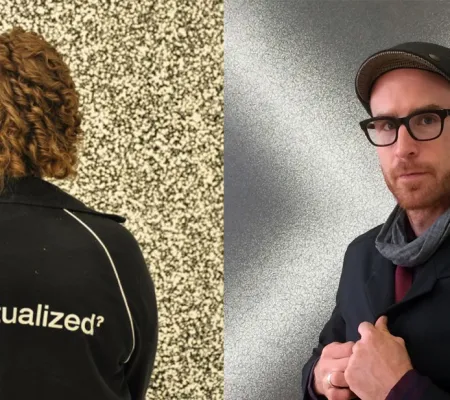Left: Denise Markonish. Photo by Michael Oatman
Right: Ian Alden Russell. Photo by Jane Androski
This year’s 2018 Viewpoint Lecture Series is proud to present a series of lectures by curators Denise Markonish and Ian Alden Russell. The annual Viewpoint Series invites leading curators, critics, and scholars of the contemporary art world for a sequence of concentrated visits each spring. Markonish (curator at MASS MoCA) and Russell (curator at Brown University’s David Winton Bell Gallery) are currently collaborating on a book entitled Do This Instead: Curating as Practice, about how curators can better serve, and more effectively develop and deliver artists’ projects.
Defying the logic of our challenging times, Markonish and Russell call for an ethos of positivity and possibility. They are known for their generous spirits and big picture ideals. We welcome them into our studios and minds.
Lectures: Thursdays, February 8, March 22, and April 26
Seminars: Fridays, February 8, March 23, and April 27
Denise Markonish is the curator at MASS MoCA, where her exhibitions include Nick Cave: Until (catalogue: DelMonico/Prestel); Explode Every Day: An Inquiry into the Phenomena of Wonder (catalogue: DelMonico/Prestel); Jim Shaw: Entertaining Doubts; Teresita Fernández: As Above So Below (catalogue); Oh, Canada, the largest survey of contemporary Canadian art (catalogue: MIT Press); Nari Ward: Sub Mirage Lignum (catalogue); Iñigo Manglano-Ovalle: Gravity is a Force to be Reckoned With (catalogue: D.A.P); These Days: Elegies for Modern Times; and Badlands: New Horizons in Landscape (catalogue: MIT Press).
Markonish edited the books Teresita Fernández: Wayfinding (DelMonico/Prestel) and 50 Years of RISD Glass: Wonder, and with Susan Cross co-edited Sol LeWitt: 100 Views (Yale University Press). She has taught at Williams College and the Rhode Island School of Design and was the fall 2016 curator for Artpace’s International Artist-in-Residence Program in San Antonio, Texas.
Markonish earned her bachelor's degree from Brandeis and her master's degree from Bard in Curatorial Studies.
Ian Alden Russell is the curator at Brown University’s David Winton Bell Gallery, where his exhibitions include Melvin Edwards: Festivals, Funerals, and New Life; Pierre Huyghe: Untitled (Human Mask), the U.S. premier of Kurdish-Turkish artist Fatma Bucak, and the premiers of Vincent Valdez’s The Strangest Fruit series, Iraqi American artist Wafaa Bilal’s The Ashes Series, and Jin Shan 靳山’s My dad is Li Gang! 我爸是李刚!. Previously he was assistant professor of contemporary art and curatorial practice at Koç University in Istanbul, Turkey and a guest lecturer at the Chinese University of Hong Kong. Recent projects include the Don’t Follow the Wind colloquium with Art in General, New York, Mark Dion's Irish premier at Ormston House, Limerick, contributions to the Safina Radio Project at the 56th Venice Biennale, the Hong Kong Umbrella Festival responding to the 2014 Hong Kong Demonstrations, “Socially Engaged Art Practices and Education in Contemporary Discourse” at UNIDEE, Cittadellarte-Fondazione Pistoletto, and An Innocent City in Istanbul, Turkey responding to Orhan Pamuk’s Museum of Innocence.
His writings have been published by Cambridge University Press, Cittadellarte, deCordova Museum & Sculpture Park, Lars Muller Publishers, Oxford University Press, Springer-Kluwer, University of Chicago Press, and Yapı Kredi Publishers.
Born in Richmond, Virginia and educated in Ireland, he holds a Ph.D. in History from Trinity College Dublin and has held fellowships at Brown University, University of Notre Dame and University College Dublin. He currently lives in Providence, Rhode Island, where he is a co-founder of the Valley Arts District, a community advocacy group of local residents, business owners, and artists living and working in the historic industrial buildings of the Woonasquatucket River valley.
Markonish and Russell are together authoring a book on curating titled Do This Instead: Curating as Practice, about how curators can better serve, and more effectively develop and deliver artists’ projects. Balancing pragmatics and poetics, it discusses curating as both a vocation and practice – a patchwork of skills and roles tailored to each artist’s needs – involving production, facilitation, stewardship, empathy, counseling, promotion, advocacy, team-building, and troubleshooting, amongst many others.


